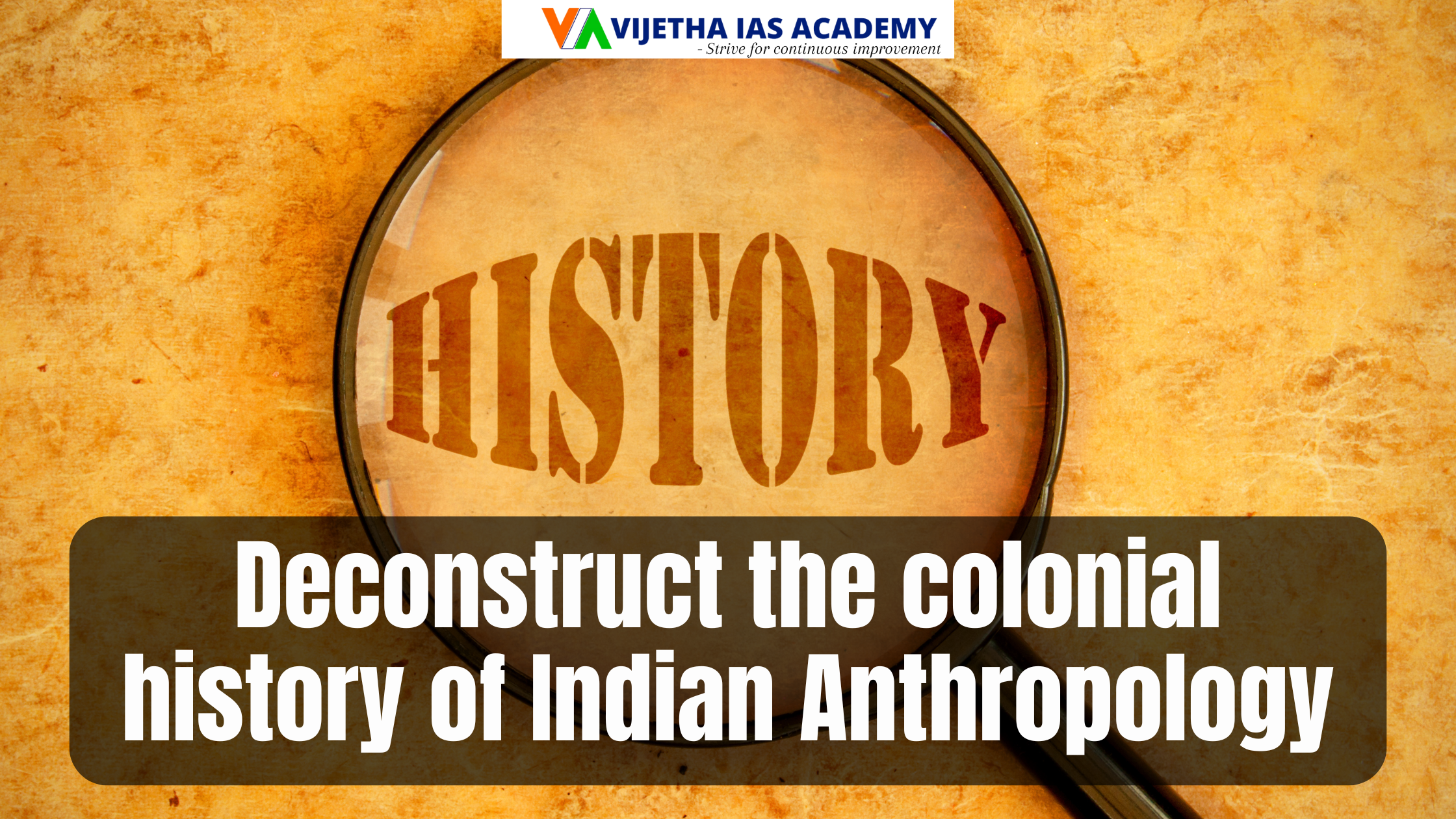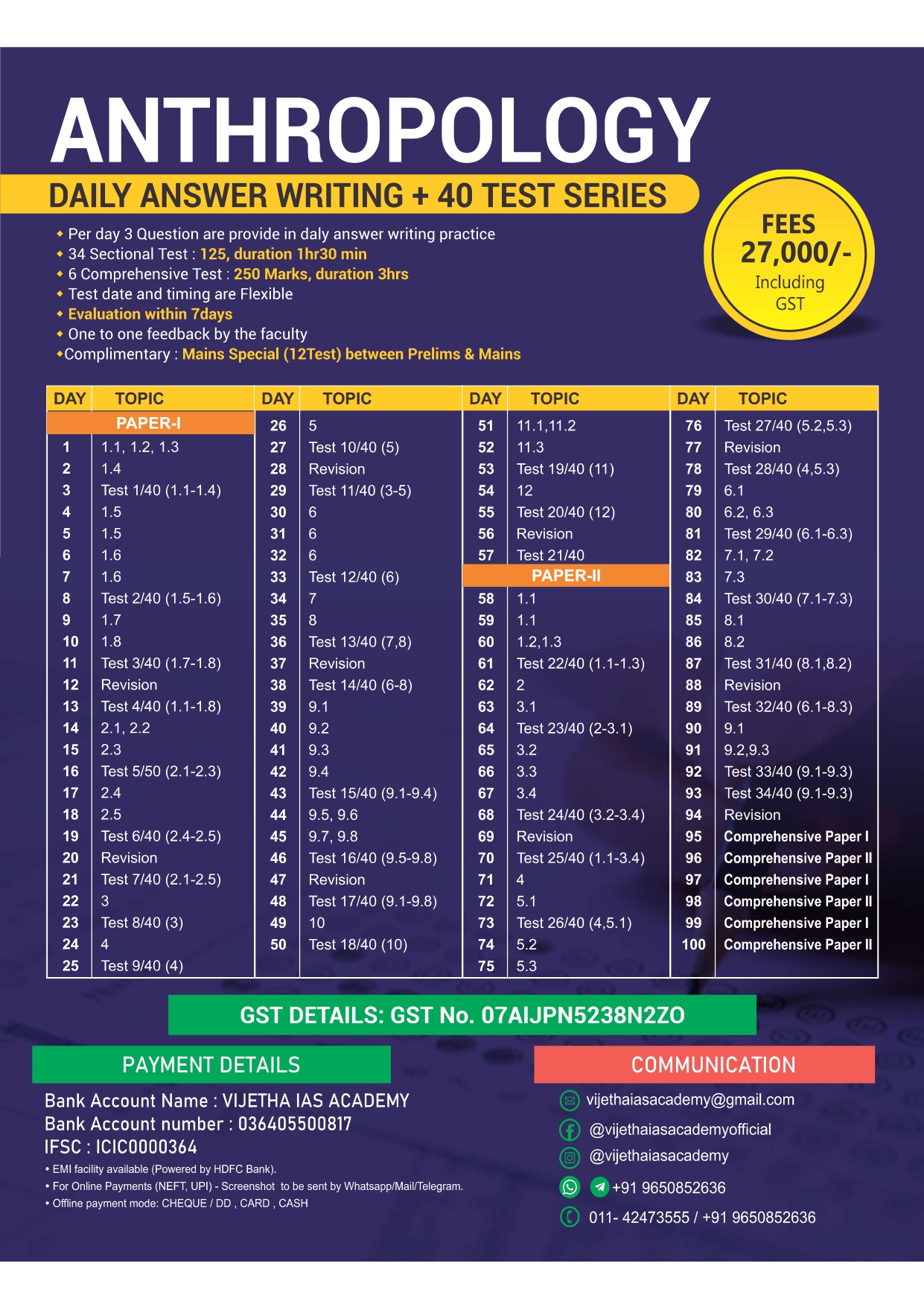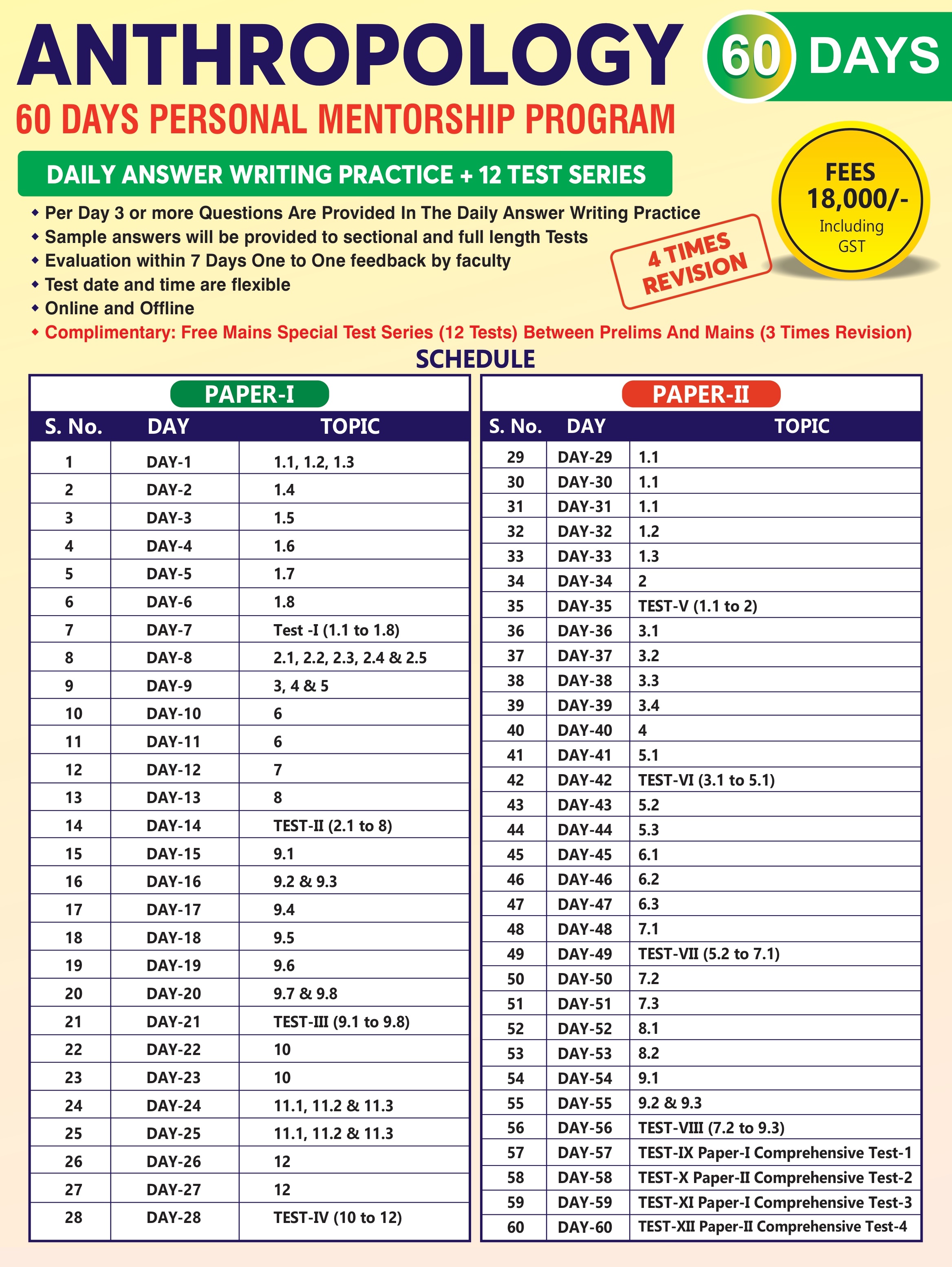
Deconstruct the colonial history of Indian Anthropology highlighting the critical role played by the Indian Anthropologists in sustaining its autonomy.
(15 Marks) Anthropology Optional Paper CSE 2024
Introduction
The colonial history of Indian anthropology is deeply intertwined with British rule, during which anthropology was used as a tool to understand, govern, and sometimes control indigenous populations. British anthropologists played a significant role in classifying Indian society, focusing on the caste system, tribal groups, and the construction of the “primitive” other. However, Indian anthropologists critically engaged with and eventually challenged these colonial narratives, playing a key role in reshaping the discipline, asserting autonomy, and contributing to post-colonial knowledge production.
Main Body
Colonial Beginnings of Indian Anthropology:
British Anthropology and Classification: During the colonial period, British anthropologists were primarily interested in studying Indian society through caste, tribes, and ethnographic data for administrative purposes. Prominent figures like Herbert Risley classified Indian populations based on racial typologies, reinforcing the colonial idea of racial superiority and justifying British rule.
Ethnographic Surveys and Censuses: The British initiated large-scale ethnographic surveys such as the Census of India (1871), which sought to classify Indian populations based on race, caste, and religion. This led to the rigidification of social identities that were previously fluid, particularly through the classification of tribal groups as “primitive” or “criminal tribes” under the Criminal Tribes Act of 1871.
Anthropology as a Tool for Colonial Control: Colonial anthropology often supported the colonial narrative of a static Indian society, legitimizing British intervention as a civilizing force. The emphasis on cultural and racial hierarchies contributed to the marginalization of indigenous knowledge systems.
Rise of Indian Anthropologists and Deconstruction of Colonial Narratives:
Challenging Colonial Classifications: Indian anthropologists such as L.K. Ananthakrishna Iyer, S.C. Roy, and N.K. Bose began to challenge the colonial focus on racial determinism and the portrayal of Indian society as stagnant. They highlighted the dynamic and fluid nature of Indian cultures, questioning the racial and cultural biases inherent in colonial anthropology.
S.C. Roy and Tribal Studies: S.C. Roy, considered the father of Indian anthropology, significantly contributed to the study of tribal communities in India. Unlike British anthropologists who viewed tribes as static and primitive, Roy emphasized the agency of tribal groups and their interactions with larger Indian society, offering a more nuanced understanding of tribal cultures.
N.K. Bose’s Nationalist Anthropology: N.K. Bose, a prominent Indian anthropologist, used anthropology as a tool for nation-building. He critiqued the colonial notion of “primitive” tribes and emphasized the cultural integration of tribes within the broader Indian civilization. Bose’s work reflected the nationalist agenda of uniting India’s diverse communities under a common cultural heritage.
Deconstructing Racial Typologies: Indian anthropologists were critical of the racial typologies developed by colonial scholars. Irawati Karve and D.N. Majumdar made significant contributions by promoting studies that focused on the cultural and social aspects of communities rather than racial distinctions.
Indian Anthropologists and the Post-Colonial Shift:
Indigenization of Anthropology: Post-independence, Indian anthropologists sought to indigenize the discipline by focusing on issues of nation-building, development, and social change. They prioritized studies on caste dynamics, social stratification, and tribal integration in independent India.
Verrier Elwin’s Advocacy for Tribes: Though British by birth, Verrier Elwin, who became an Indian citizen, played a pivotal role in tribal welfare. He advocated for tribal autonomy and opposed rapid assimilation, promoting the preservation of tribal cultures.
Autonomy in Methodology: Indian anthropologists like D.P. Mukerji and M.N. Srinivas developed indigenous methodologies, such as Srinivas’s concept of “Sanskritization”, to explain social mobility within the caste system. This marked a shift away from the colonial approach of static social hierarchies, reflecting the changing social realities of post-colonial India.
Indian Anthropological Institutions: The establishment of Indian research institutions, such as the Anthropological Survey of India and various university departments, further cemented the autonomy of Indian anthropology. These institutions focused on indigenous knowledge systems, and the study of Indian society from local perspectives.
Critical Role of Indian Anthropologists:
Indian anthropologists played a critical role in reshaping the discipline by engaging with colonial knowledge and producing indigenous scholarship that focused on India’s social, cultural, and political complexities. They developed new frameworks for understanding caste, tribe, and social mobility, breaking away from colonial stereotypes.
Indian anthropology has remained relevant in contemporary times, addressing issues such as development, tribal rights, social justice, and the impact of modernization on indigenous communities. This relevance stems from the discipline’s ability to engage critically with colonial legacies while adapting to post-colonial realities.
Conclusion
The colonial history of Indian anthropology is marked by the use of the discipline as a tool for control and classification by the British, who sought to categorize Indian society in ways that served their colonial agenda. However, Indian anthropologists played a pivotal role in deconstructing these colonial narratives by challenging racial and cultural stereotypes and advancing autonomous scholarship. Their contributions have not only reshaped the field but also ensured that anthropology in India remains relevant in addressing the country’s social and cultural diversity in post-colonial contexts.
Anthropology Test Series Programme (Online + Offline))
We provide Anthropology Daily Answer Writing a range of programs designed to cater to various stages of UPSC preparation. Whether you're just starting out, have attempted the Mains before, or are getting ready for Mains 2024, we have the right option for you. Allow us to assist you in choosing the course that best fits your needs.
|
Level of Preparation |
Test Series Program |
Test Series Content |
Test Schedule |
|
Self-study of Anthropology Optional |
Anthropology 100 Days Personal Mentorship Program |
Daily answer writing, 34 sectional tests, 6 comprehensive tests, and complementary Mains Special 12 tests (between prelims and mains) |
|
|
Revise whole syllabus through Daily Answer Writing Practice and Tests |
Anthropology DAW Mentorship Program |
Daily Answer Writing Practice and 8 sectional and 4 Full Length tests |
|
|
Revise whole syllabus through Sectional and Full Length Tests |
Anthropology Tier- I T-40 Test Series |
34 Sectionals and 6 Full Length Tests |
|
|
Written Mains earlier and need more practice |
16-Anthropology Tier II Test Series |
10 sectional and 6 Full-Length Tests. |
|
|
Cleared Prelims 2023 and are preparing for Mains 2023 |
Mains Special 12 Tests program |
8 Sectional and 4 Full-Length Tests |
ANTHROPOLOGY MAINS SPECIAL COURSES
Enroll in our Anthropology Mentorship Program today and take the first step towards achieving your UPSC goals!
1) If you are going for Self study of Anthropology Optional and looking for a Comprehensive Program that includes Daily Answer Writing, 34 Sectional tests, 6 Comprehensive tests, and Complementary mains special 12 tests (between prelims and mains), our Anthropology 100 Days Personal Mentorship Program is the perfect choice.
2) If you want to revise Whole Syllabus through Daily Answer Writing Practice and 8 sectional and 4 full length tests, then our Anthropology DAW Mentorship Program is the best fit for you.
3) If you want to revise Whole Syllabus through 34 Sectionals and 6 Full Length Tests then Anthropology Tier- I T-40 Test Series is for you.
4) If you have written Mains earlier and need more practice, then our 16-Anthropology Tier II Test Series is a great option. This test series includes 10 sectional and 6 full-length tests.
5) if you have cleared Prelims 2023 and are preparing for Mains 2023,our Mains Special 12 Tests program is a must-have. This program includes 8 sectional and 4 full-length tests to help you prepare for the big day.
For more information on Vijetha IAS Academy’s Anthropology mentorship programs Deatils : https://vijethaiasacademy.com/anthropology-test-series
Anthropology 100 Days Personal Mentorship Program ( 7 + 3 Times Revision )

Anthropology 60 Days Personal Mentorship Program ( 4 + 3 Times Revision )

For more information: https://vijethaiasacademy.com/anthropology-test-series
Details Of Anthropology Classes Program
Top Anthropology Optional IAS Coaching Center in Delhi Vijetha IAS Academy | Best Anthropology Optional IAS Coaching in Delhi
Fee Structure:
- Tier 1: Rs. 55,150/- (3 Years Validity of Offline/Live Batch)
- Tier 2: Rs. 42,000/-
- Tier 3: Rs. 36,000/-
Batch Size: 50 – 60 Students
UPSC Notes
Anthropology Optional IAS Coaching Notes, IAS Exam Preparation Booklets, IAS optional coaching Notes, UPSC Coaching Notes, Video Lectures, Live Classes with faculty, Chat Facility Available
Teachers Name: N P Kishore Sir
Past Result
- Last Years Result 2023
- 35 Total Selections in CSE 2023
Google Reviews: 4.9 out of 5 stars
Website: Vijetha Anthropology Optional IAS Coaching in Delhi (https://vijethaiasacademy.com)
Faculties of Vijetha IAS Academy
- N P Kishore Sir
Features
- Vijetha IAS Academy offers Online and offline Courses for better preparation of Anthropology Optional Strategy for UPSC in Delhi.
- For better Anthropology optional Exam Preparation, Vijetha IAS Academy Delhi Conducts the Motivational IAS Session.
- Vijetha IAS Academy provides you with the CASE STUDIES on the pattern of the real-time IAS Exam which is helpful for better preparation of the Best Coaching for UPSC Anthropology Optional Optional IAS Examination.
- DAW & WAW – Revision Through Daily & Weekly Answer Writing Practice is offered by Vijetha IAS Academy for better result of the Anthropology Optional IAS examination.
Advantages of joining Vijetha IAS Academy
- Best Faculties for Anthropology Optional IAS Coaching in Delhi
- Best facilities, infrastructure and updated Case Studies Booklets and Notes for better preparation of the Anthropology Optional IAS Examination in Delhi.
- Best result in Past years for Anthropology Optional Strategy for UPSC Examination in Delhi
- Best Rated coaching institute for Anthropology Optional IAS Examination in Delhi.
- Vijetha IAS Academy also provides recorded lectures videos, notes which is very helpful for better preparation of Anthropology Optional IAS Coaching in Delhi
Fees Structure of Vijetha IAS Academy
|
Tier 2 |
Tier 1 |
Tier 3 |
BATCH STARTS FROM |
|
42,000/- |
55,150/- (3 Years Validity Offline/Live Batch) |
36,000/- |
REGISTRATION – START |
Fees Structure of Vijetha IAS Academy
|
Course Name |
Fees Amount |
Course Duration |
|
GS Offline (Pre + Mains+ CSAT) with Essay+Answer Writing |
Rs.99,000 (Including GST) |
400+ Days |
|
GS Online |
Rs.18,999 (Including GST) |
400+ Days |
|
GS Mentorship Programme |
Rs.29,999 (Including GST) |
1 Year |
For more information on our courses, visit our Anthropology Courses page. Explore our Test Series and Online Courses for flexible learning options.
Vijetha IAS Academy
Add. 2nd Floor, 50, Shankar Road, Block 7, Old Rajinder Nagar, Rajinder Nagar, New Delhi, Delhi 110060
MOB. 096508 52636
Open 7 Am: Closes 9 PM
_____________________________________________________________________________________________________________________
Keywords: Synergistic Effects of Biological and Cultural Factors in Human Evolution , anthropology 2024 question paper, Anthropology optional subject question paper 2024, Anthropology optional 2024 question paper, Anthropology Optional Coaching UPSC, Vijetha IAS Academy Anthropology, Anthropology crash course UPSC, Anthropology daily answer writing UPSC, Kishore sir Anthropology
